SUMMARY
This is AI generated summarization, which may have errors. For context, always refer to the full article.

Facebook has become one of the key parts of the machinery used by politicians as they seek posts for the upcoming 2022 Philippine elections. Despite being sometimes prone to abuse and left unchecked against threats and harassment, the platform has been widely used by Filipinos in the past years – with the Philippines being dubbed as the social media capital of the world.
As the first-of-its-kind pandemic election approaches, political camps have been using Facebook groups to send out updates to followers and to coordinate movements across the country, at times resulting in high engagement in online communities.
Facebook groups have also become a good conduit for political propaganda. In January, a group ‘rebranded’ itself from being a Facebook community about Philippine history to a repository of Ferdinand Marcos Jr propaganda.
But this high usage of Facebook group features does not necessarily entail big political participation in virtual communities.
This was a key finding of the study titled ‘Depoliticization of the Political in Facebook Groups’ presented by Julienne Thesa Y. Baldo-Cubelo, Luisa C. Pineda, and Candice Marie V. Perez during a #FactsFirstPH briefing held Friday, April 1.
The study focused on how followers in a group may become “depoliticized” or grow silent and become passive observers in political discussions within the Facebook group – a negative for democracy – due to a variety of factors.
The study acknowledged that it appears “counterintuitive” for people to become depoliticized inside groups where election-related content is posted and shared – and yet, that’s what’s happening at times:
“How can there be ‘depoliticization’ in a political activity such as in the sharing of, commenting on, and posting of elections-related content? This is counterintuitive if we think of it. Our analysis is an invitation to seeing an image that is not apparent but consequently moves people away from engagement,” the study reads.
Lead author Baldo-Cubelo, Pineda, and Perez are part of the Philippine Media Monitoring Laboratory of the Communication Research department of the University of the Philippines Diliman.
Citing studies, the authors defined “depoliticization” as the “lack of political choice and deficiency of spaces for expressing varied styles of making a choice.” In other words, rich, varied discussion as in a healthy democracy is reduced, possibly leading to absolute claims or a simplistic black-and-white understanding of issues.
“When there is moral panic around issues like the drug war or reproductive choice, stakes are high, but alternatives should not be bound by binaries and absolutisms,” the study said.
How do we know when ‘depoliticization’ happens in Facebook groups? Authors cite absolutism and fundamentalism in posts.
— Aloïs Isinika (@aloisinika) April 1, 2022
“Captions and comments from FB group members often have a tone of impenetrable agreement with the posts shared.” pic.twitter.com/R84PSL2tPC
The researchers scanned 5,379 unique public Facebook group posts on elections-related topics covering May 2021 – or a year before the national elections – until January 2022. The final sample size used by the team is 54 posts.
The researchers listed traits and factors, as seen from the sampled posts, that contribute to depoliticization in Facebook groups:
- Absolute truths that prohibit opinion-making. Captions and comments from FB group members often have a tone of impenetrable agreement with the posts shared. These expressions of assent often include strong affirmations of the singularity of choice – only this leader, only this path.
- Simplistic binaries (such as wrong and right) that do not expand discussion. When only two alternatives are presented, people not content with either will not join or continue with the discussion. When one option can be so wrong while the other can be very right, then there is no use for further deliberation.
- Being “apolitical” as self-preservation. This makes users leave after participation, because to “be political” could be too costly when health, peace, or friendships are at stake.
- Smartphones and other technologies allowing users to experience first-hand witnessing of events, according to the study. But without caption and proper context, posts can mislead users.
- Audience commodification, since some Facebook group served as means for transactions such as buy-and-sell, etc.
The study also compared Facebook groups to a road intersection where there is “high engagement from many people coming from different directions.”
This nature of Facebook groups being like an intersection, leads to a “looseness of relationships” that may allow for the seeding of political content that goes unchallenged, likely becoming a potent avenue for disinformation or propaganda.
The authors argued, “The looseness of relationships matched with loose affinity [in Facebook groups], allows for seeding political content that is not challenged. The data analyzed showed how in-group call-outs are rare while ‘seen’ posts are most common,” the authors wrote.
Baldo-Cubelo, the lead author of the study, emphasized that Filipinos should not lose sight of what is happening on the ground, especially in the context of the upcoming elections.
She also reminded the users to practice netiquette when participating in discussions.
“We have the tools for tolerance and respect and kindness and compassion, we just have taken the digital space for granted. Feeling natin tapunan ng basura (We feel like the Facebook group environment is a dump site),” Baldo-Cubelo said.
The authors gave recommendations for Filipino Facebook users not to succumb to manipulation in groups, advising to own ‘citizenship’ in digital spaces where users have given their consent to participate in, being aware of the red flags in groups, and flagging posts and knowing when to leave.
“The counterintuitiveness of ‘depoliticized’ engagement makes it pass by us unchecked. Under our noses and in spaces we give our consent to sharing with others, there is a movement that happens: people receding into silence and giving-up their space,” the authors concluded. – with a report from Alois Isinika/Rappler.com
Add a comment
How does this make you feel?

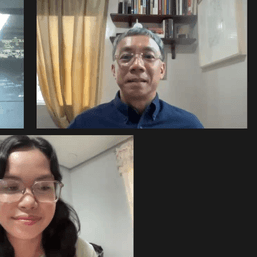
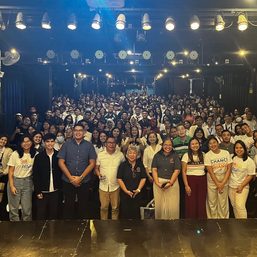
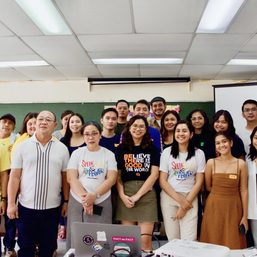
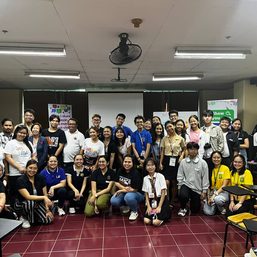
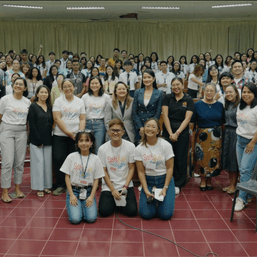



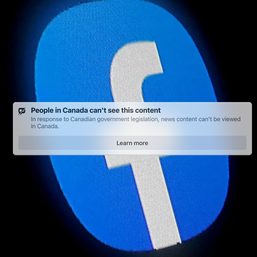
![[OPINYON] Takoyaki tattoo at ang business model ng pang-iinis](https://www.rappler.com/tachyon/2024/04/20240410-Takoyaki-tattoo.jpg?resize=257%2C257&crop_strategy=attention)
There are no comments yet. Add your comment to start the conversation.